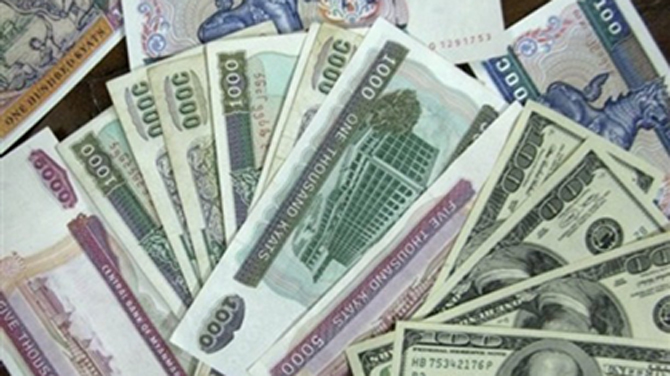As Burma's president, former general Thein Sein, acknowledges that the country's economy is struggling under the weight of multiple challenges, the question that is foremost on many minds right now is how his government will restructure a foreign-exchange regime that is fast becoming his administration's most pressing problem.
Since the beginning of this year, the Burmese currency, the kyat, has appreciated by more than 25 percent, putting severe pressure on the country's export sector and threatening any effort to restart the economy after decades of stagnation under direct military rule.
Currently sitting at around 750 kyat to the dollar, compared to more than a 1,000 kyat to the US unit a year ago, the exchange rate received a rare mention by a Burmese ruler last week, when Thein Sein, speaking to an audience of economists, businessmen and local aid organizations, said on Wednesday that the strengthening local currency is hurting the economy.
To reduce the burden on exporters, the government has cut export revenue tax on seven items—rice, beans and pulses, sesame, rubber, corn, marine products and animals and animal products—from 7 to 2 percent, and given them an exemption from commercial tax for a period of six months, from Aug 15 to Feb 14, 2012.
“We very much welcome the government's decision to provide a tax cut,” said Hla Maung Shwe, the vice-chairman of the Myanmar Fisheries Federation—adding, however, that with a loss in revenue of around 25 percent, “exporters are still feeling the pinch.”
There are several reasons for the appreciation of the kyat. Besides the declining value of the dollar worldwide, other factors include high oil and gas prices (Burma's biggest export is natural gas) and a spending spree by cronies of the military elite, who in the run up to this year's transition to ostensibly civilian rule used their massive dollar reserves to buy up property, gems and state assets.
The danger now, say experts, is that the exchange rate could reach a point where repatriated earnings from exports are no longer sufficient to cover the costs of production, inflicting huge losses on businesses that could force enterprises to shut down.
Another problem that could emerge is that locally manufactured goods could be squeezed out of the domestic market by cheap imports—something that would have far-reaching effects on an economy that has long been geared to self-sufficiency.
“The economic, social and political consequences of this chain of events could be serious,” wrote U Myint, a leading Burmese economist and the top economic advisor to Thein Sein, in a recent paper addressing the exchange-rate issue.
If any good has come of this situation, it is that Naypyidaw seems to be taking U Myint's warning to heart. The government recently told Burmese business leaders that it was preparing to change the official exchange rate, currently set at around six kyat to the dollar, and would soon terminate its use of Foreign Exchange Certificates (FECs), which are circulated in place of US dollars domestically.
Dumping an unrealistic and grossly inefficient system that has long distorted the country's economy is definitely a step in the right direction, but it is one that will require a degree of expertise that is completely lacking among the country's key decision makers.
That's why the government has turned to the International Monetary Fund (IMF) for advice. This will first of all involve asking Naypyidaw to provide key macroeconomic data, such as foreign exchange reserves, balance of payments, national budget, money supply, and GDP—including its sectoral composition and growth rate—household income and expenditures surveys, foreign direct investment inflows, and foreign trade statistics.
There is little, however, that the IMF can do in practical terms.

